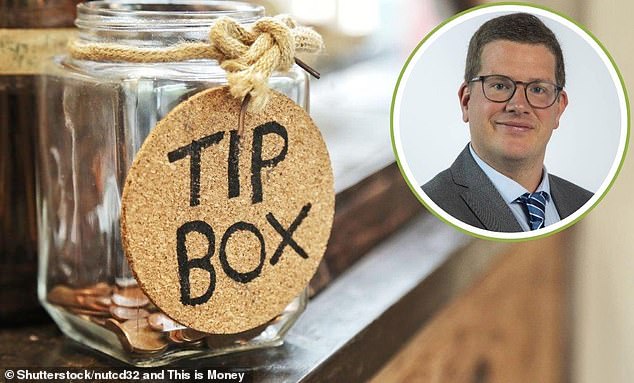New tipping legislation came into effect this week. It means that restaurants and the like must share tips with workers fairly and transparently.
While many restaurants and other businesses have already been doing this, there have been some high-profile examples where this practice has not been the norm.
And where this is not the case, workers will have more rights to defend themselves.
But putting aside the fairness of how tips are shared, I am increasingly frustrated by the tactics used by some in the hospitality industry to guilt-trip us into tipping.
Be warned: I’m all for tipping when service is good, but I won’t be forced to do so to make it the norm.
I recently visited a local coffee shop where I have been a loyal customer for many years. They had revised their payment system, meaning that if you want to pay by card you have to go to the counter, rather than a member of staff coming with the machine.
It’s one of those tablet style payment devices and when you turned it over to pay, there was first a screen to navigate.
A green smiley face can be clicked for a 20 percent tip, a slightly sadder yellow face for 15 percent, or an upset red face for a 10 percent tip.
Buried at the bottom of the screen, faceless, was the no-tip option.
Listen, I like the coffee, the service and food are always good, and I tip, but only in cash. However, the tip jar was gone.
In my opinion, there’s something so impersonal about tipping with a card that I decided against it, and when I hit the no-tip tab, I felt a momentary pang of guilt.
Would the owner, the waitress and the customers know what he had done? On the other hand, why should I feel bad? He had given me a happy face/sad face childhood system, which frankly belongs in an elementary school classroom.
A green smiley face can be clicked for a 20% tip, a slightly sadder looking yellow face for a 15% tip, or an upset red face for a 10% tip. Buried at the bottom of the screen, faceless, was the no-tip option.
In short, all this nonsense seems like another Americanization of Britain and, speaking to colleagues, friends and family, I know many feel the same.
I get it in the United States. Some states have an incredibly low minimum wage, which is often offered to hospitality positions and tips make up a large portion of your salary. Here it’s just different.
More than a decade ago, I lamented the increase in the not-so-“optional” service charge. Things have only gotten worse since then.
When you ask to have an optional service charge waived, it often feels like you can hear a pin drop in the restaurant you’re at. Frankly, it’s a little embarrassing.
Nothing has changed my view of that piece. I wrote in 2013: I’m not saying we should stop tipping waiters/waitresses, but it should be for merit, not because a bar or restaurant wants to tip.
And it’s not just cafes and restaurants that do this, other places like bakeries do it too. Last week, television personality Kate Lawler posted a high-profile post on social media.
She revealed she had paid almost £9 for a loaf of bread… and says at the payment terminal she was asked if she wanted to leave a tip.
‘I didn’t touch any tips and then had the audacity to feel stingy, what in the world is going on?’ She said in the clip.
I know that feeling and it leaves a bitter taste in my mouth. Another example is that of taxi drivers, who now usually accept the card. There is a strange feeling about not leaning using this method, given the small space you are in.
And don’t get me started on the pubs that do it, when the drinks are simply placed in front of you at the bar, they aren’t even brought to your table.
With this new tipping legislation coming into force, it should mean that any tips you give will now be fair to the staff. In fact, it will be illegal for companies to ignore them.
That eliminates the question to a waiter/waitress: If I tip, will you definitely receive the money and won’t it fill the owner’s coffers?
I will continue to tip cash when I deem it worthy: I won’t blindly tap my card to do so, nor will I feel guilty in front of a screen in some kind of behavioral economics.
The Government says millions of workers will take home around £200m as a result of the changes.
But there are likely to be winners and losers. Employment tribunals can compensate for breaches, which could pose a new headache for hotel owners already struggling with higher overheads.
The regulations state that staff have the right to see their employers’ tipping policy and records of how many tips punters gave.
It’s estimated that around four in five tips are made using a debit or credit card, and by doing so, bosses will likely find it easier to keep the cash. This new legislation, on paper, seems much fairer.
Most importantly, though, I’ll continue to tip cash when I think it’s worthy—I won’t blindly tap my card to do so or feel guilty looking at a behavioral economics-style screen.
Sorry, 10 percent sad face.
Did you leave a tip out of guilt or were you asked for a tip somewhere unusual? Get in touch: editor@thisismoney.co.uk
Some links in this article may be affiliate links. If you click on them, we may earn a small commission. That helps us fund This Is Money and keep it free to use. We do not write articles to promote products. We do not allow any commercial relationship to affect our editorial independence.



